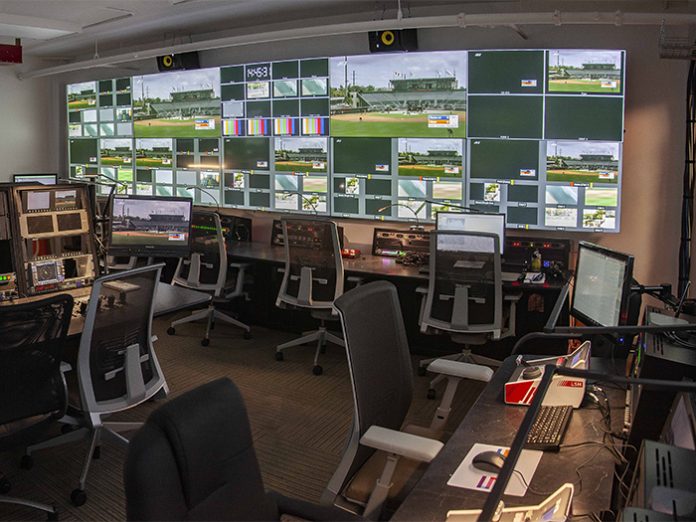Prior to 2020, The University of Miami redesigned its live sports production workflows to ensure all audio feeds were on the network with Audinate’s Dante. From field mics to mixers – and from basketball to soccer – the University made the choice to trust Dante for all audio-over-IP capabilities.
“We don’t have a single XLR patch anywhere in our workflow,” said Anthony Lestochi, Director of Production Services at the university. “Moving to Dante was clearly the better way to operate. It made building out our production really easy and effective. And, when COVID happened, Dante made it easy to quickly adapt.”
Audinate’s Dante is the de facto standard for digital audio networking, and distributes hundreds of uncompressed, multi-channel digital audio channels via standard Ethernet networks, with near-zero latency and perfect synchronization. Dante allows audio, control, and all other data to coexist effectively on the same network.
Dante has also proven its flexibility over the course of 2020. As productions needed to drastically alter their approach to adhere to COVID-19 safety guidelines, the ability to use Dante audio-over-IP as a connective fabric was a crucial enabler.
“When we looked to bring production back, the first thing we did was knock walls down in our control room,” Lestochi said. “We totally rearranged the space and put up new physical barriers to allow for effective social distancing in the new control room. Because it was a Dante-backed system, we could run all of our new positions for equipment onto the network and know it would work quickly. It was a very easy change, and one that wouldn’t have been so quick if we were using traditional cabling.”
The control room continues to make use of the same broadcast technology in place prior to the change in physical layout. Two Yamaha CL5 mixing consoles and a Behringer X32 mixing console provide all mix capabilities for the many Dante signals on the network.
Field and announcer microphones located on site are made Dante-native using Shure ANI4IN audio network interfaces. Multiple Studio Technologies 45DR Dante to 2-Channel Party-Line Intercom Interfaces – which are Dante native – are also used to allow two-way communication.
In total, Lestochi says there are roughly 60 Dante devices in use in the production – and on any given day, multiple productions can take place with around 100 Dante signals running seamlessly across the local network.
Of course, that’s just for the on-site capabilities. In the University of Miami’s broadcast buildout, Dante is also working from home.
Remote announcers have become increasingly common as a result of COVID-19 social distancing and travel recommendations. Lestochi said it’s a practice that many viewers likely don’t even realize is taking place.
The Miami production team’s largest events are men’s and women’s basketball in the winter season – and to produce them, Dante is heading into the home.
Glensound Inferno commentator’s boxes – which are Dante-native kits built specifically for live announcer commentary – are sent to an announcer’s home. The system then interfaces with an in-home Mac computer using Dante Virtual Soundcard and Unity Connect software – which facilitates sending a Dante signal at the highest possible quality over the public internet.
“That setup allows for bidirectional channels and two-way communication,” Lestochi said. “The talent can talk to each other as they watch the game, and the director and producer can also talk with the talent. Without that setup it would be nearly impossible for us to do this. It enables the talent to work the games from their home without much difference in the quality of the broadcast.”
The control room located on The University of Miami campus brings in the audio signal and provides mixing and audio-to-video embedding – using an Evertz Scorpion-4 Media Processing Platform – before sending the final product via a direct line to the university’s production partner.
Lestochi considered what it would require to make the same changes had the university not utilized Dante.
“It would definitely be a lot more expensive and require a lot more hardware and cabling,” he said. “And the management of the system, and some of the technical aspects to the audio signals, would be very, very tricky if we were doing this with copper. It would likely be far too complex to feasibly do.”
Lestochi said with Dante, not only were changes made rapidly and affordably, but the system allowed for considerations on how to best manage the increasingly remote nature of the work. For example: Lestochi said he can log in to a university system remotely from his house and quickly make a change on Dante Controller software to ensure the system is working effectively.
“It’s those little moments in the process where you realize how much you’ve gained with Dante,” he said. “All of it comes down to confidence. And we have a lot of that right now with our system.”



